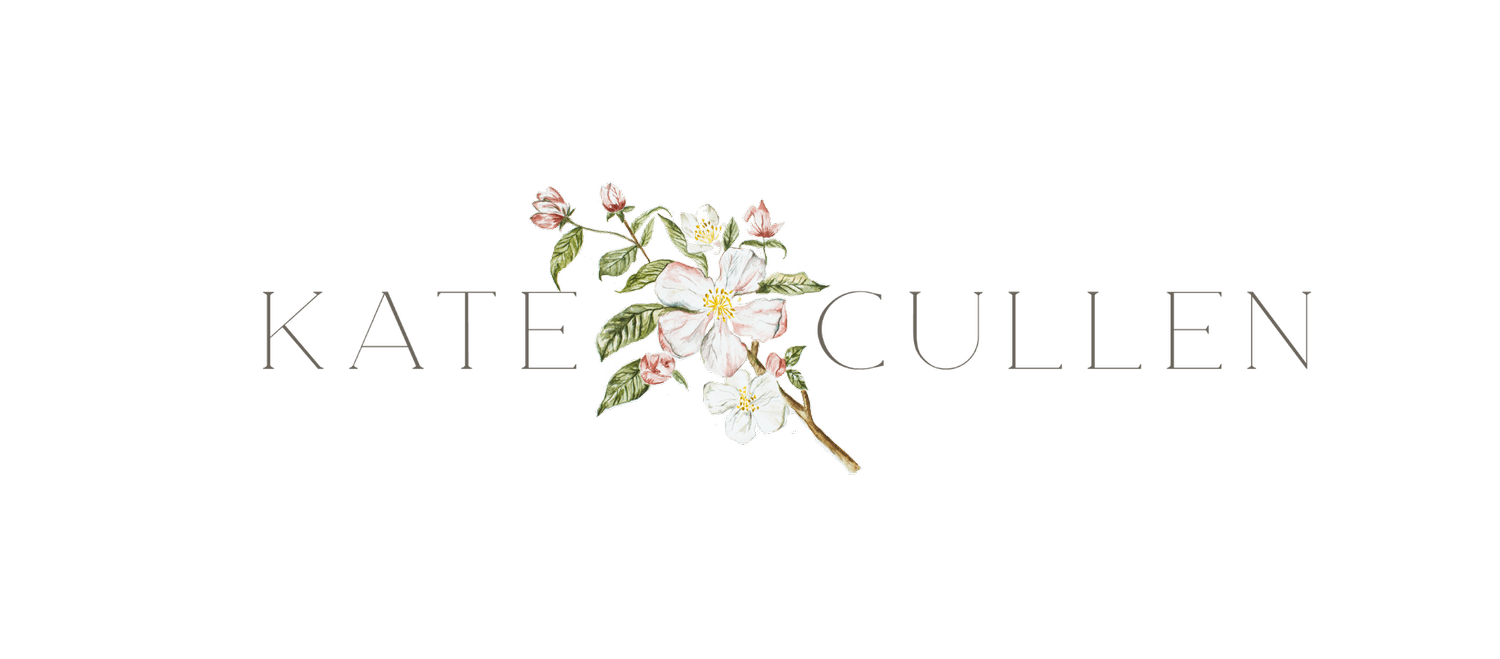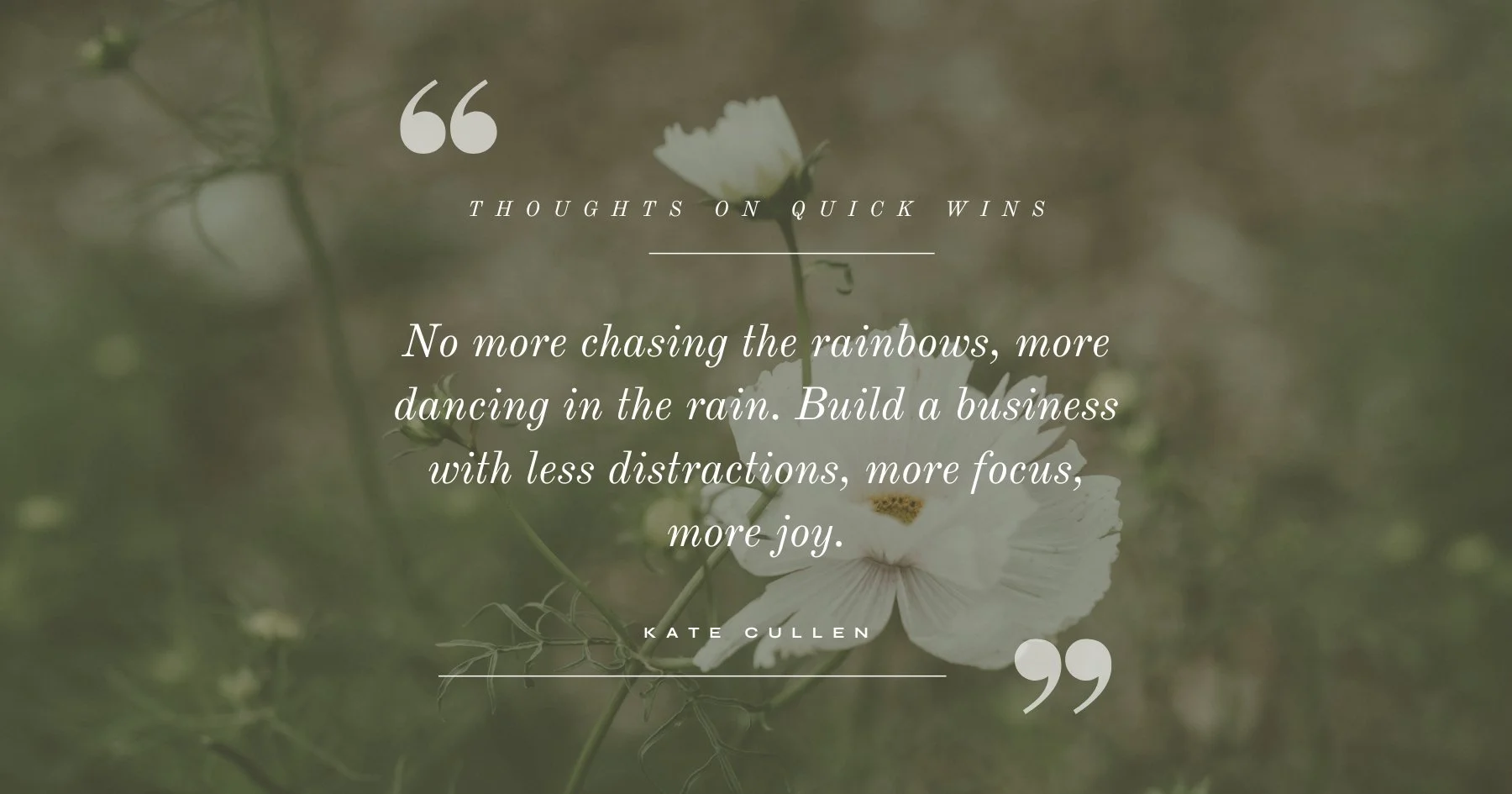Building a sustainable creative business – how to move away from chasing quick wins and the cult of ‘more’
Lately I’ve been pondering on the ‘quick wins’ phenomenon, how the business world seems to value ‘bite size’, ‘quick solutions’ and ‘immediate results’ over sustainable, ongoing, trust building, culture-orientated, relationship-building actions – the building blocks of true success. If you do any business-orientated Google search lately these fast-focussed phrases seem to appear time and again. And frankly it makes me feel, well.. tired… all that energy and focus on immediate delivery and then ‘next’.
It's the antithesis of how I like to work, and how I believe a truly sustainable business (in the sense of your own energy, capability and passion) should be run.
What success in business looks like to me
What success looks and feels like to you will be unique to you and only you, but I believe there are some strong uniting factors for most creative people and how they view their work, life and goals. Financial security is important, but more often than not, not the primary driver when you set up your own business.
Instead, you probably (like I did) focus on the different ways you can work outside of the usual employed 9-5 structures. i.e. time to simply be creative, time to think about each project carefully before taking action, creating with purpose and intent beyond the profit margins, the ability to work when it feels aligned, to seek out clients that feel the same way you do and have the same moral and ethical frameworks. Success might be having resources to devote to your other passions, to causes or beliefs you care about deeply. Your business might be a facilitator for these altruistic intentions, or a mechanism by which you can communicate your own message to the world.
All that quick wins deliver are really the bottom line. There’s no soul work, no passion, no true purpose.
In my own business I have found the truest feelings of success have come through helping my clients, or creating imagery that connects. None of these things feel supported by the ‘quick win’ mentality.
The influence of slow living on business practices
The slow living movement seems to have infiltrated almost every other aspect of life fully, apart from business. Those quick 5 day challenges, or 5 minute fixes all have their place, but when it comes to building a business you love to work on not just in there simply must be a deeper level of learning if your business is to survive beyond those first heady months and years. I’m a passionate learner (I’ve signed up to 3 courses and 2 webinars already this year), all of them will require hours or days’ worth of attention, and I am ready for that.
I don’t want a ‘quick win’, I want to learn on a deeper level, to immerse myself in my chosen fields with the understanding that it might take me weeks or months to get where I want to be with it. For there to be a lot more beneath the façade.
And I’m ok with that – although I am impatient by nature, the last couple of years have taught me that true change, true success comes not with fast action or snap decisions, but with considered commitment to understanding before actioning changes to my business (and working on myself too).
Indeed committing to sustained, ongoing activities like my weekly newsletter and my weekly blog post has been a revelation, one where I have truly been allowed to grow, to build relationships on a deeper level, and feel more connected to my work than ever before.
If you have undertaken your own slow living lifestyle changes you already know that it takes commitment and resilience to truly change the way you do things. It doesn’t have to be ‘hard’, it just needs to be the method by which you achieve the change you want to see in your business.
10 ways to embrace slower living in your business
Embrace the longer form – take time to create longer ideas, more in depth blog posts or newsletters.
And conversely take time out to commit to reading or viewing the longer form again, whether it’s a novel or someone who you admire’s content. You don’t need ‘more’, you simply need to be more focussed on what you do consume. Read more from fewer people, not less from more people. Give them your most valuable commodity, time, and reap the benefits it gives.
Sign up to that immersive course or workshop, rather than signing up to 5 quick challenges you never complete.
Do less, but do it better and with more intent. Purpose and passion over volume. One beautifully crafted Instagram post is worth a dozen reels about nothing to the right customer.
Be conscious about what information you consume. Do a mini audit of what content you have read/seen for the next week or two. How much of it actually resonated or stayed with you? Give those accounts/people your time and unfollow the rest.
Turn off the chaos. Try not to be always ‘doing’, allow the gaps and the silence to take over now and again. You’ll be surprised at how much better your creativity flows.
Slow things down. Instead of rushing writing that email or Instagram caption, set aside double the time and see what results from that added focus and intention. Think about what you truly want from it before pressing send or publish.
If you find yourself feeling anxious about a task try turning off all distractions and sitting quietly for a while before diving in. It can have a profound impact on the way you handle difficult moments as well as the easier ones.
Take time to listen. Rather than reacting to a comment or statement immediately, reframe your thoughts around what people are truly trying to say to you, where their problems might really lie. You’ll be able to help them better and you will in turn feel better about how you approached it.
Find enjoyment in little rituals that allow you space and time to think. It might be something as simple as taking 5 minutes to enjoy your coffee in the garden over sitting with it at the computer.






